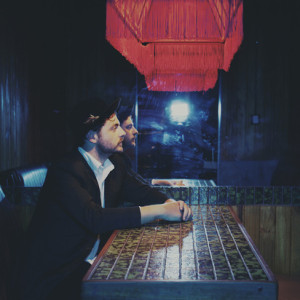31 Mar BLOG | Hue Blanes & the Moon
ARTISTIC DIRECTOR’S BLOG / Mar31
MKA Artistic Director Tobias Manderson-Galvin stepped out to see HUE BLANES AND THE MOON at the Melbourne Comedy Festival. These are his thoughts…

Hue Blanes, and a light.
As the moon is a reflection of the light of the sun; perhaps Hue Blanes and the Moon is a reflection of the true Hue Blanes. There’s a palpable, ever-present risk during the show, and your correspondent finds himself grateful, and left wondering if looking at the real Blanes may be as damaging as staring at the sun.
Hue Blanes and the Moon is a perfect theatrical picture – both portrait and landscape – (Hue Blanes; and the Moon) of a man and world at their darkest points – socially, creatively, and politically. Directed by Travis Cotton, and produced by Martin Martini, the work is captivating, and one of the most honest, saggital comedies I’ve seen.
To see it yourself – and you must – you’ve got to go to a temporarily repurposed warehouse opposite the Bennets Lane jazz club, so yes Melbourne, down an alleyway. I’m not sure the bar is licensed, and I’m not sure if it’ll hold up in the rain, so yeah – it’s the quintessentially Melbourne production. Venue aside, the memory of my pleasure has yet to subside, and like a waking fugue, I’m not entirely sure what images of the show occured in my dreams after the show and what happened live.
This was my first time witnessing Hue Blanes’ creation, an unsettlingly tragic, realist musical-comedian named ‘Hue Blanes’. Talking to others about previous Blanes performances, I come to understand the discipline of Blanes’ construction, and how he takes a hopeless, if pleasant – basically a clown – and builds an existential conspiracy around him. I am a relatively pretentious member of the general public so I go in expecting to be troubled, and I’m not disappointed, Blanes, Cotton and Martini had made an ideal, dada entertainment.
an ideal, dada entertainment
Blanes situates this hilarious, affable fellow in the tiny lounge room of something like Flanders & Swann via Bad Boy Bubby. Perhaps baby lounge room is better given the size of the piano that – counter to it’s proportions and title – manages to monster most of the stage. Blanes embodies the vessel that holds the poison wine of a banal, terribly secretive new world. The setting serves the production well: the lounge room, a mid-Californian bungalo – maybe Elwood, maybe Coburg – a tired, barren abyss with the odd, incongruous culture-jammed propaganda poster (replete with North Korean and Chinese leaders); and a continually building series of props and barely-integrated instruments, lending the niggling suspicion that even when railing against it, the creep of consumerism finds a way in.
And perhaps you already know Hue Blanes. In his simple, maybe op-shop suit, unkempt beard, and a fuzzy bauble atop his already incongruos red and white trucker cap — a ghost, only more dangerous – a necromantic solution from a music hall long since destroyed. At least that’s who we see when he’s singing; in this production we also glimpse – if not the man back-stage, at least the man in the wings. His genuine delight in a wind-up robot toy, his elevation of a small pocket box of raisins to tribute to the gods; he’s a satyr of an Apollo. A lunatic. At one point he walks from the stage picks up a melodica, brings it back on stage, and then just hangs it on the wall. It’s suggestive, if sickly, mouthpiece dangling above Hue’s head as he sits to play at the piano again.
he sings a lullaby about a Mr Vladimir Putin (to rhyme with Rasputin)
To many the comedy will come in as a second reason to buy a ticket – the first reason that most will have most attending is Blanes’ incredible musical displays. His work on the keys is virtuosic; there’s jazz stuff, there’s classical, there’s neo-classical avant-garde noise. There is much more. His voice is not of this time; and nothing about the presentation suggests otherwise but his songs constantly surprise. At one point he sings a lullaby about a Mr Vladimir Putin (to rhyme with Rasputin) who ‘is a very lonely man’, who ‘tries to write a lullaby but instead he wrote a rag’. He then runs his way through a rag; a man possessed – immediately undercutting his initial premise – his stride piano taking us to a depth of emotion the lullaby had failed to do. Most of his songs and stories have a recognisable structure. The audience, through-out the work, are acknowledged whether by inclusion in his songs, or with the occasional wink – in this way he’s all the entertainer of a shy, possibly malevolent Peter Allen.
The phantasmagoric songs that litter the work take us to the titular moon and back, and all manner of people, places and events from the mercilessly mundane to the unreasonably treacherous. There’s at least one moment of gospel, and an occasional play with a peculiar shrine in one corner of the space, where he worships god only knows what; and he never settles on what to call it.
‘I have many names’ he says at a point. In a recurring song in which he introduces himself repeatedly as entirely different people. And then, in one of the final sections of the night he calls himself Hue which is after all his name in the title of the show, but so who is he? Hue is ever an unreliable narrator, and yet time and again he circles back to asking us to consider the truth.
Ladies!
Hue Blanes and the Moon is almost entirely spent with Hue on the piano, but other moments do add to the constellation of moments. A recording of his own voice interrupts him later in the work sparking an argument about the nature of his own performance. Lamenting the patriarchy, to cheers from the audience he then calls out in the familiar sinister, comic ring ‘Ladies!’. A point in which Hue holds a full glass of wine, and then raises it to his lips and only pretends to drink from it – taking no liquid – is bizarre, and an example of how the significance of even the smaller moments can hit the audience with an innate panic.
One of the most disturbing parts of Hue Blanes and the Moon is an apocalyptic, anti-soothsaying song; the refrain of ‘in the future’ repeated throughout – but, and perhaps most extraordinary for a work of entertainment, the phrase ‘in the future holidays will be on tv’ received a collective gasp of pain and recognition from those in attendance. The song reveals Blanes’ satire at it’s most effective; bridging absurdity and humanity. Well, that and a song he claims is ‘For China’, and I wont ruin what that one’s about but suffice for now to say my sister did not care for it (though she did love him calling out ‘ladies’ so the ledger comes out ahead).
Hue Blanes is a personality—he’s extraordinary. He traverses the ground of tragic conspiracy to comedy, and Cotton’s direction guides us from piece to piece with the same illumination promised in the title. If Ella Fitzgerald sings of ‘only a paper moon’ Blanes sings of a moon made of hundred dollar bills, bibles and suicide notes. And he’s every bit as listenable. Hue Blanes and the Moon plays its mockery with humility, desolation with sincerity, and implicates us in lunacy.
HIGHLY RECOMMENDED – GO SEE IT!
You can see Hue Blanes and the Moon by going here Official Booking Site
